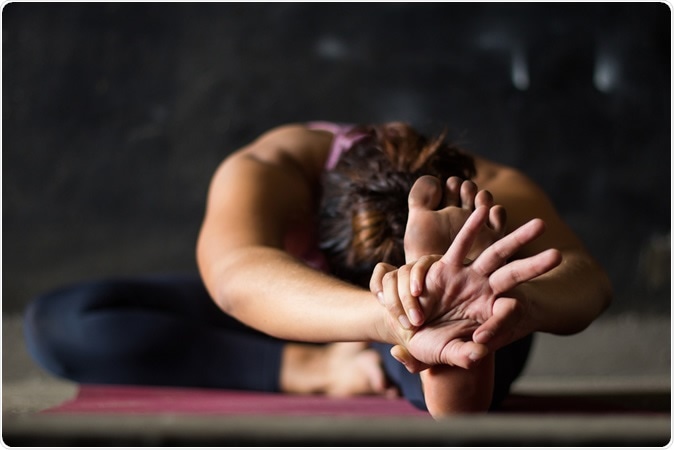According to new research from researchers at the University of Sydney, Yoga practice could do more harm than good in some participants. Yoga is an ancient Indian form of spiritual practice that involves a series of body postures, deep breathing techniques and balance of the mind and body. The study was published in Journal of Bodywork and Movement Therapies.

Image Credit: Marian Lopez Ojeda / Shutterstock
The latest study, contrary to all has been written earlier regarding the benefits of yoga, finds that yoga could be worsening or exacerbating old injuries and leading to new ones. In the study, at least 10% of the individuals complained of a new pain after taking up yoga practice. Further, 21% individuals complained of worsening or exacerbation of the previous injuries after taking up yoga practice. Particularly pain in the upper limbs and shoulder pain was worsened with yoga they noted. Around 13% of the new pain that came after a year of yoga were in the upper limbs – shoulders, elbows, wrists or hands.
For this study participants aged around 45 years were chosen. They were all based in New York and regarding their experience, they ranged from beginners to practiced yoga followers with nearly 20 years of experience. A total of 354 individuals who practiced yoga were included and then they were followed up for a year. At the end of the year they were given a questionnaire to fill up and were assessed according to their answers. Around 74% of the participants however reported a significant improvement in their low back and neck pain after yoga practice.
Associate Professor Evangelos Pappas, a study author said that this study showed that just like any other sport could be dangerous for an injury, yoga is too. Pappas himself is also a yoga instructor incidentally and is not against yoga practice he reiterated. He added that yoga is beneficial for most part but there is no reason to believe that it is free from any risk. It has been seen that the risk of injuries estimated by earlier researchers was 1 to 2.5% risk of injury with yoga.
Study authors say that the numbers could be higher than this. Researchers explain that upper limbs or arms are not weight bearing and putting the body weight on them is not desirable. In yoga there are several postures that involve putting the weight of the whole body on the outstretched hands and arms with downward dog postures and inversions of the body. This could be a reason for the worsening of the upper limb painful conditions say researchers.
Several yoga trainers and advocates of yoga are “in denial” say experts. They refuse to accept that yoga could cause any harm. However some veteran yoga trainers agree that this is an area of research and there in not enough evidence on yoga and a more detailed analysis of how much damage it can do vis-à-vis the benefits it can provide would only make the practice safer, they add. A potential for injury may be eliminated if more science was involved. Most of the yoga poses could be complicated and difficult to reach easily. So there has to be some amount of stretching and straining to reach there. A joint that was not moving easily would also be stretched and this could result in an injury just like after any form of exercise on a damaged joint say researchers.
According to Pappas, these injuries are preventable. Appropriate training and good teachers help a lot. Teachers or trainers who do not understand the injuries or damage the joints have may do more harm than good. Capabilities of each person should determine how much they can be made to do he explained. Discussions on pre-existing pain, especially in the upper limbs with physical therapists as well as yoga instructors can help tailor the yoga regimen for every individual Pappas explained and postures could be modified for maximum benefit.